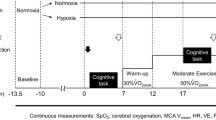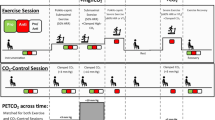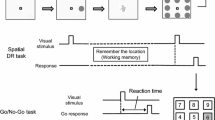Abstract
Introduction
Studies of cerebral haemodynamics have shown changes with increased exercise intensity, but the patterns have been highly variable and reliable associations with cognitive performance have not been identified. The aim of this study was to examine whether exercise-induced changes in oxygenated haemoglobin (O2Hb) led to changes in concomitant cognitive performance.
Methods
This study examined cardiorespiratory and cerebral haemodynamics during multi-stage exercise from rest to exhaustion, with (Ex + C) and without (Ex) concurrent cognitive performance (Go/No-go task).
Results
The presence of the cognitive task affected both cardiorespiratory and cerebral haemodynamics. The patterns in the cerebral haemodynamics during Ex and Ex + C diverged above the respiratory compensation threshold (RCT), but differences were significant only at 100% \(\dot {V}{{\text{O}}_{{\text{2max}}}}\), displaying increased deoxygenated haemoglobin (HHb), decreased difference between oxygenated and deoxygenated haemoglobin (HbDiff), and decreased cerebral oxygenation (COx) during Ex + C. More complex haemodynamic trends against intensity during Ex + C suggested that the presence of a cognitive task increases cerebral metabolic demand at high exercise intensities. The levels of O2Hb, HHb, HbDiff and total haemoglobin increased most steeply at intensities around the RCT during both Ex and Ex + C, but these changes were not accompanied by improved cognitive performance.
Conclusion
The primary hypothesis, that cognitive performance would match changes in O2Hb, was not supported. Small variations in reaction time and response accuracy across exercise intensities were not significant, suggesting that cognitive performance is unaffected by intense short-duration exercise. Our results add further evidence that exercise-induced changes in cerebral haemodynamics do not affect cognitive performance.



Similar content being viewed by others
Abbreviations
- ANOVA:
-
Analysis of variance
- COx:
-
Cerebral oxygenation
- Ex:
-
Exercise only group
- Ex + C:
-
Exercise and cognition group
- HbDiff:
-
Difference between oxygenated and deoxygenated haemoglobin
- HHb:
-
Deoxygenated haemoglobin
- HR:
-
Heart rate
- mL · kg−1 · min1 :
-
Millilitres per kilogram per minute
- NIRS:
-
Near-infrared spectroscopy
- O2Hb:
-
Oxygenated haemoglobin
- PETCO2 :
-
Partial pressure of end-tidal carbon dioxide
- POmax :
-
Maximal power output
- RCT:
-
Respiratory compensation threshold
- RR:
-
Respiratory rate
- RT:
-
Reaction time
- THb:
-
Total haemoglobin
- \(\dot {V}{{\text{O}}_{{\text{2max}}}}\) :
-
Maximal rate of oxygen consumption
- \(\dot {V}{{\text{O}}_2}\) :
-
Volume of oxygen consumption
- \(\dot {V}{\text{C}}{{\text{O}}_2}\) :
-
Volume of carbon dioxide consumption
- V t :
-
Tidal volume
- VE:
-
Minute ventilation
- \({\text{VE/}}\dot {V}{\text{C}}{{\text{O}}_2}\) :
-
Ratio of minute ventilation to volume of carbon dioxide consumption
- W:
-
Watts
References
Ando S, Kokubu M, Yamada Y, Kimura M (2011) Does cerebral oxygenation affect cognitive function during exercise? Eur J Appl Physiol 111(9):1973–1982. https://doi.org/10.1007/s00421-011-1827-1
Ando S, Hatamoto Y, Sudo M, Kiyonaga A, Tanaka H, Higaki Y (2013) The effects of exercise under hypoxia on cognitive function. PLoS One 8(5):e63630. https://doi.org/10.1371/journal.pone.0063630
Barstow TJ, Mole PA (1991) Linear and nonlinear characteristics of oxygen uptake kinetics during heavy exercise. J Appl Physiol 71(6):2099–2106
Bhambhani Y, Malik R, Mookerjee S (2007) Cerebral oxygenation declines at exercise intensities above the respiratory compensation threshold. Respir Physiol Neurobiol 156(2):196–202. https://doi.org/10.1016/j.resp.2006.08.009
Bodner ME, Rhodes EC (2000) A review of the concept of the heart rate deflection point. Sports Med 30(1):31–46. https://doi.org/10.2165/00007256-200030010-00004
Cannon DT, Kolkhorst FW, Buono MJ (2009) On the determination of ventilatory threshold and respiratory compensation point via respiratory frequency. Int J Sports Med 30(3):157–162. https://doi.org/10.1055/s-0028-1104569
Casey BJ, Trainor RJ, Orendi JL, Schubert AB, Nystrom LE, Giedd JN et al (1997) A developmental functional MRI study of prefrontal activation during performance of a Go-No-Go task. J Cogn Neurosci 9(6):835–847. https://doi.org/10.1162/jocn.1997.9.6.835
Chang YK, Labban JD, Gapin JI, Etnier JL (2012) The effects of acute exercise on cognitive performance: a meta-analysis. Brain Res 1453:87–101. https://doi.org/10.1016/j.brainres.2012.02.068
Chung S-C, You JH, Kwon JH, Tack GR, Lee B, Yi JH, Son SH (2007) Memory performance, hyperoxia, and heart rate following oxygen administration. In: Magjarevic R, Nagel JH (eds) World congress on medical physics and biomedical engineering 2006, vol 14. Springer, Berlin Heidelberg, pp 802–804
Del Giorno JM, Hall EE, O’Leary KC, Bixby WR, Miller PC (2010) Cognitive function during acute exercise: a test of the transient hypofrontality theory. J Sport Exerc Psychol 32(3):312–323. https://doi.org/10.1123/jsep.32.3.312
Diamond A (2013) Executive functions. Annu Rev Psychol 64:135–168. https://doi.org/10.1146/annurev-psych-113011-143750
Dietrich A, Audiffren M (2011) The reticular-activating hypofrontality (RAH) model of acute exercise. Neurosci Biobehav Rev 35(6):1305–1325. https://doi.org/10.1016/j.neubiorev.2011.02.001
Dietrich A, Sparling PB (2004) Endurance exercise selectively impairs prefrontal-dependent cognition. Brain Cogn 55(3):516–524. https://doi.org/10.1016/j.bandc.2004.03.002
Dorfman J (1998) Chap. 8 Problem solving, inhibition, and frontal lobe function. In: Advances in psychology, vol 125, pp 395–448
Elliott R (2003) Executive functions and their disorders. Br Med Bull 65:49–59
Fowler B, Taylor M, Porlier G (1987) The effects of hypoxia on reaction time and movement time components of a perceptual-motor task. Ergonomics 30(10):1475–1485
Franceschini MA, Thaker S, Themelis G, Krishnamoorthy KK, Bortfeld H, Diamond SG et al (2007) Assessment of infant brain development with frequency-domain near-infrared spectroscopy. Pediatr Res 61(5 PART 1):546–551. https://doi.org/10.1203/pdr.0b013e318045be99
Giles GE, Brunyé TT, Eddy MD, Mahoney CR, Gagnon SA, Taylor HA, Kanarek RB (2014) Acute exercise increases oxygenated and deoxygenated hemoglobin in the prefrontal cortex. Neuroreport 25(16):1320–1325. https://doi.org/10.1097/WNR.0000000000000266
Grassmann M, Vlemincx E, Von Leupoldt A, Mittelstädt JM, Van Den Bergh O (2016) Respiratory changes in response to cognitive load: a systematic review. Neural Plast. https://doi.org/10.1155/2016/8146809
Grazzi G, Mazzoni G, Casoni I, Uliari S, Collini G, Heide L, Conconi F (2008) Identification of a Vo2 deflection point coinciding with the heart rate deflection point and ventilatory threshold in cycling. J Strength Cond Res 22(4):1116–1123. https://doi.org/10.1519/JSC.0b013e318173936c
Hughson RL, O’Leary DD, Betik AC, Hebestreit H (2000) Kinetics of oxygen uptake at the onset of exercise near or above peak oxygen uptake. J Appl Physiol 88(5):1812–1819
Lambourne K, Tomporowski PD (2010) The effect of exercise-induced arousal on cognitive task performance: a meta-regression analysis. Brain Res 1341:12–24. https://doi.org/10.1016/j.brainres.2010.03.091
Lehto JE, Juujärvi P, Kooistra L, Pulkkinen L (2003) Dimensions of executive functioning: evidence from children. Br J Dev Psychol 21(1):59–80. https://doi.org/10.1348/026151003321164627
Lucas SJE, Ainslie PN, Murrell CJ, Thomas KN, Franz EA, Cotter JD (2012) Effect of age on exercise-induced alterations in cognitive executive function: relationship to cerebral perfusion. Exp Gerontol 47(8):541–551. https://doi.org/10.1016/j.exger.2011.12.002
Madsen PL, Secher NH (1999) Near-infrared oximetry of the brain. Prog Neurobiol 58(6):541–560. https://doi.org/10.1016/S0301-0082(98)00093-8
Matsui M, Tanaka K, Yonezawa M, Kurachi M (2007) Activation of the prefrontal cortex during memory learning: near-infrared spectroscopy study. Psychiatry Clin Neurosci 61(1):31–38. https://doi.org/10.1111/j.1440-1819.2007.01607.x
McMorris T, Graydon J (2000) The effect of incremental exercise on cognitive performance. Int J Sport Psychol 31(1):66–81
Mekari S, Fraser S, Bosquet L, Bonnéry C, Labelle V, Pouliot P et al (2015) The relationship between exercise intensity, cerebral oxygenation and cognitive performance in young adults. Eur J Appl Physiol 115(10):2189–2197. https://doi.org/10.1007/s00421-015-3199-4
Mendonca CT, Schaeffer MR, Riley P, Jensen D (2014) Physiological mechanisms of dyspnea during exercise with external thoracic restriction: role of increased neural respiratory drive. J Appl Physiol 116(5):570–581. https://doi.org/10.1152/japplphysiol.00950.2013
Mezzani A, Agostoni P, Cohen-Solal A, Corrà U, Jegier A, Kouidi E et al (2009) Standards for the use of cardiopulmonary exercise testing for the functional evaluation of cardiac patients: a report from the Exercise Physiology Section of the European Association for Cardiovascular Prevention and Rehabilitation. Eur J Prev Cardiol 16(3):249–267. https://doi.org/10.1097/HJR.0b013e32832914c8
Miyake A, Friedman NP, Emerson MJ, Witzki AH, Howerter A, Wager TD (2000) The unity and diversity of executive functions and their contributions to complex “frontal lobe” tasks: a latent variable analysis. Cogn Psychol 41(1):49–100. https://doi.org/10.1006/cogp.1999.0734
Nabetani T, Ueda T, Teramoto K (2002) Measurement of ventilatory threshold by respiratory frequency. Percept Mot Skills 94(3 PART 1):851–859
Powers SK, Baker BA, Deason R, Mangum M (1984) A trend analysis of steady state oxygen consumption during arm crank ergometry. J Sports Med Phys Fitness 24(2):131–134
Prickett C, Brennan L, Stolwyk R (2015) Examining the relationship between obesity and cognitive function: a systematic literature review. Obes Res Clin Pract 9(2):93–113. https://doi.org/10.1016/j.orcp.2014.05.001
Schmit C, Davranche K, Easthope CS, Colson SS, Brisswalter J, Radel R (2015) Pushing to the limits: the dynamics of cognitive control during exhausting exercise. Neuropsychologia 68:71–81. https://doi.org/10.1016/j.neuropsychologia.2015.01.006
Scholey AB, Moss MC, Neave N, Wesnes K (1999) Cognitive performance, hyperoxia, and heart rate following oxygen administration in healthy young adults. Physiol Behav 67(5):783–789. https://doi.org/10.1016/S0031-9384(99)00183-3
Schulz KP, Fan J, Magidina O, Marks DJ, Hahn B, Halperin JM (2007) Does the emotional go/no-go task really measure behavioral inhibition? Convergence with measures on a non-emotional analog. Arch Clin Neuropsychol 22(2):151–160. https://doi.org/10.1016/j.acn.2006.12.001
Stuss DT (2006) Frontal lobes and attention: processes and networks, fractionation and integration. J Int Neuropsychol Soc 12(2):261–271. https://doi.org/10.1017/S1355617706060358
Subudhi AW, Miramon BR, Granger ME, Roach RC (2009) Frontal and motor cortex oxygenation during maximal exercise in normoxia and hypoxia. J Appl Physiol 106(4):1153–1158. https://doi.org/10.1152/japplphysiol.91475.2008
Tempest GD, Eston RG, Parfitt G (2014) Prefrontal cortex haemodynamics and affective responses during exercise: a multi-channel near infrared spectroscopy study. PLoS One. https://doi.org/10.1371/journal.pone.0095924
Tempest GD, Davranche K, Brisswalter J, Perrey S, Radel R (2017) The differential effects of prolonged exercise upon executive function and cerebral oxygenation. Brain Cogn 113:133–141. https://doi.org/10.1016/j.bandc.2017.02.001
Thomas R, Stephane P (2008) Prefrontal cortex oxygenation and neuromuscular responses to exhaustive exercise. Eur J Appl Physiol 102(2):153–163. https://doi.org/10.1007/s00421-007-0568-7
Timinkul A, Kato M, Omori T, Deocaris CC, Ito A, Kizuka T et al (2008) Enhancing effect of cerebral blood volume by mild exercise in healthy young men: a near-infrared spectroscopy study. Neurosci Res 61(3):242–248. https://doi.org/10.1016/j.neures.2008.03.012
Tomporowski PD (2003) Effects of acute bouts of exercise on cognition. Acta Physiol (Oxf) 112(3):297–324. https://doi.org/10.1016/S0001-6918(02)00134-8
Trommer BL, Hoeppner JA, Lorber R, Armstrong KJ (1988) The go-no-go paradigm in attention deficit disorder. Ann Neurol 24(5):610–614. https://doi.org/10.1002/ana.410240504
Turner CE, Barker-Collo SL, Connell CJ, Gant N (2015) Acute hypoxic gas breathing severely impairs cognition and task learning in humans. Physiol Behav 142:104–110. https://doi.org/10.1016/j.physbeh.2015.02.006
Witte M, Ninaus M, Kober SE, Neuper C, Wood G (2015) Neuronal correlates of cognitive control during gaming revealed by near-infrared spectroscopy. PLoS One. https://doi.org/10.1371/journal.pone.0134816
Wolf M, Wolf U, Toronov V, Michalos A, Paunescu LA, Choi JH, Gratton E (2002) Different time evolution of oxyhemoglobin and deoxyhemoglobin concentration changes in the visual and motor cortices during functional stimulation: a near-infrared spectroscopy study. NeuroImage 16(3 I):704–712. https://doi.org/10.1006/nimg.2002.1128
Wolf U, Toronov V, Choi JH, Gupta R, Michalos A, Gratton E, Wolf M (2011) Correlation of functional and resting state connectivity of cerebral oxy-, deoxy-, and total hemoglobin concentration changes measured by near-infrared spectrophotometry. J Biomed Opt. https://doi.org/10.1117/1.3615249
Acknowledgements
We are grateful to Glen Davis for access to the near-infrared spectroscopy equipment and Che Fornusek for assistance in its operation. We thank John Eisenhuth for construction of the Go/No-go instrumentation.
Funding
No funding was used to support this study.
Author information
Authors and Affiliations
Contributions
CMC conceived the original design, with all authors contributing to the design of the final study. DS conducted the experiment. DS, NOD and MH analysed the data. DS drafted the manuscript, to which all authors contributed.
Corresponding author
Ethics declarations
Conflict of interest
None of the authors have any conflict of interest to declare.
Additional information
Communicated by Mark Olfert.
Electronic supplementary material
Below is the link to the electronic supplementary material.
Rights and permissions
About this article
Cite this article
Stevens, D., Halaki, M., Chow, C. et al. The effects of multi-stage exercise with and without concurrent cognitive performance on cardiorespiratory and cerebral haemodynamic responses. Eur J Appl Physiol 118, 2121–2132 (2018). https://doi.org/10.1007/s00421-018-3942-8
Received:
Accepted:
Published:
Issue Date:
DOI: https://doi.org/10.1007/s00421-018-3942-8




